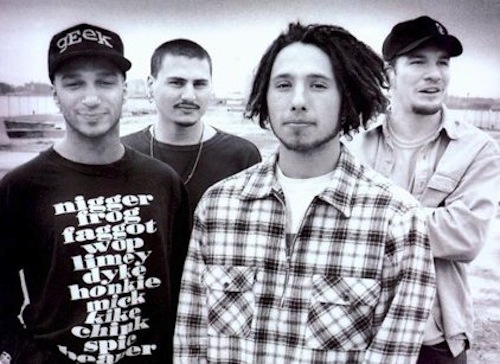Charming Charlie sent me this nuanced—and equally ranty, so buckle up—assessment of what it means that Paul Ryan likes Rage Against the Machine. I know that tidbit came out a few weeks ago, but you know it was the most important reveal of the 2012 election. Either Barack Obama or Mitt Romney will be our next president; such details pale in comparison to the knowledge that the man who wants to end Medicare rocks out to “Killing in the Name.” The Last Psychologist, if that is his real name, believes that the whole thing is a setup—the question that brought this information to light, the co-opting of little- and big-r Rage by MTV, the faux media outrage, everything. I think he is exactly half right.
Definitely, Rage Against the Machine is not a real force of rebellion or even social change. Rage Against the Machine is a band. The idea that a band can also be a revolt is both specious and fundamental to America’s concept of self for the last fifty years. Presumably, there was some time when bands could legitimately threaten the order—probably near peak use of the word “negro.” But since Little Richard and Bob Dylan we have seen Ozzy and the Sex Pistols and RuPaul and Gwar, and American society remains intact.
We still own property privately and screw people who don’t. We still act as if which rock/pop/rap bands you listen to determine the line between conformity and rebellion. It’s the same marketing tactic that we use to sell Mountain Dew and Apple computers, and occasionally Miracle Whip. The rebel sell is the best way to offer products and services to Americans, who love to A) flaunt their refusal to conform to the expectations of a monolithic society and B) buy stuff.
Rage Against the Machine was produced under contract with Sony—a company that gets points for being literally un-American, but which otherwise is one of the more important parts in the machine against which Rage raged. I first saw their videos on MTV, a subsidiary of Viacom. Before that, I read about them in Guitar World, which is published by Iran. My point is that Rage Against the Machine was actively and deliberately sold to us—like, as the Last Psych points out, the news that Ryan likes them. The LP feels they were co-opted, that any rebellion their music may have provoked was safely dissipated in the Sony-MTV-Dan Barry’s car-high school parking lot machine that brought them to us. I disagree.
Whatever marketing apparatus once existed around Rage Against the Machine can safely be said to have fallen away. The band broke up. MTV stopped playing their and all other videos. If ever there was a time to experience the band’s albums separately from the marketing culture that co-opted them, now is that time. Yet Paul Ryan, who listens to them a lot in the present day, is so fully integrated into the machine that he is the Republican candidate for vice-president. That is literally the most complicit position in America.
So we have a control group—me and everyone else who was an adolescent male in 1993—that heard Rage with the full marketing power of Sony/Viacom behind them. We have an experimental group—Paul Ryan—that hears Rage on little white ear buds. Our experimental group was openly dedicated to destroying the military-industrial complex and, post-Rage exposure, did nothing. Our control group is an open booster of same and, post-Rage, loves war and business even more.
It’s almost as if the power of Rage Against the Machine as a flashpoint for rebellion was not suppressed by the marketing machine at all. It was created by the marketing machine. Certainly, the lyrics “[fudge] you, I won’t do what you tell me” and “freedom: yeah, right!” are there in the music, but it takes a village of PR consultants to make you hear it. In its pure form, Rage Against the Machine is just a bunch of guitar solos and yelling. It is gym music.
The genius of contemporary American marketing is that it not that it makes us believe Rage Against the Machine is subversive. It’s how. The combined force of Sony, MTV and Rolling Stone not only made us think Rage was revolutionary but also made us think that The Machine restrained its revolutionary power. The band’s failure to remake society doesn’t mean that the music is just music; it means the music was co-opted by a corporate mainstream. The only way to fight it is to really listen to RATM, and maybe go to a concert and get a shirt.
It’s a beautiful marketing strategy—one that makes a virtue of a fault, and one Paul Ryan should understand. After all,he is the VP candidate of the party that says we can do more for the rich and has styled itself a pack of revolutionaries. It makes perfect sense that Paul Ryan likes Rage Against the Machine. It does not make sense that we are still surprised.





On the other hand, Ryan claims Atlas Shrugged made a huge impact on his thinking and course in life. (And as with RATM, it seems likely that Rand would disavow any connection with Ryan). So maybe the novel is the revolutionary art form. Or maybe you would need to control for age in your experiment. I suspect that even though early 90s listeners of RATM didn’t go directly to the barricades, listening to RATM and similar politically-oriented music probably had some long terms effects.
You would be right in your assessment except for the fact that you know not nearly enough about RATM. if you listen to ALL of their catalogue Zack clearly says they were “hijacking the airways.” why not use the already established “machine” to help destruct it. I don’t know why Paul Ryan likes RATM. He’s just a puppet so you can’t blame him for being dumb.